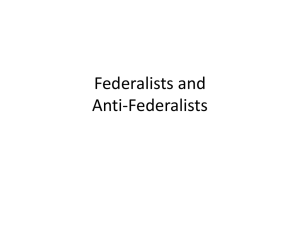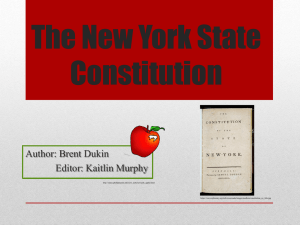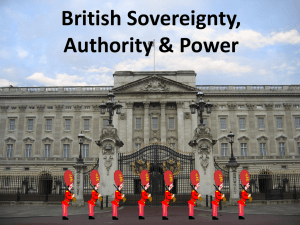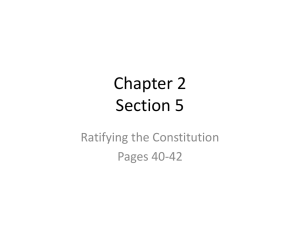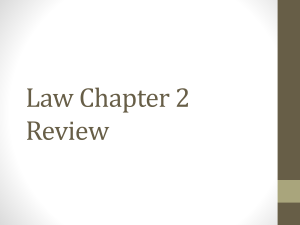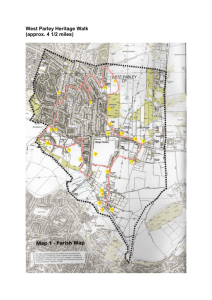Blank Jeopardy
advertisement
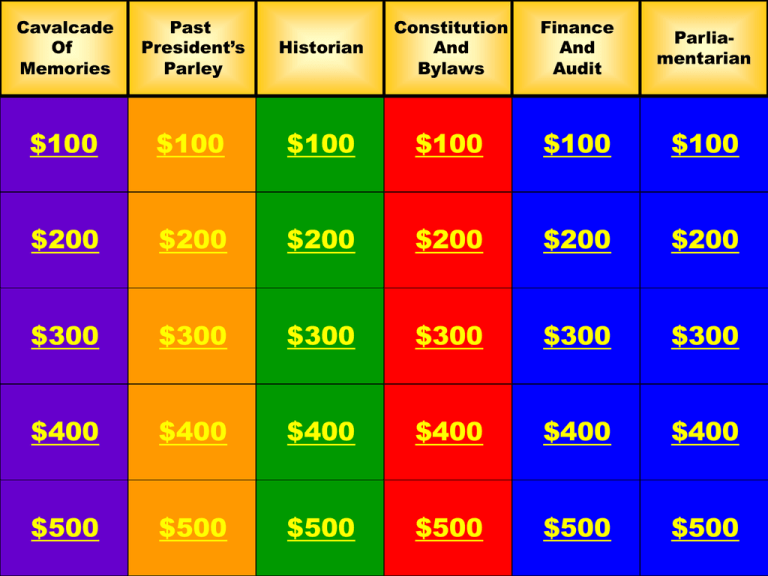
Cavalcade Of Memories Past President’s Parley Historian Constitution And Bylaws Finance And Audit Parliamentarian $100 $100 $100 $100 $100 $100 $200 $200 $200 $200 $200 $200 $300 $300 $300 $300 $300 $300 $400 $400 $400 $400 $400 $400 $500 $500 $500 $500 $500 $500 $100 – Cavalcade • Where are ALA Past National Presidents, Secretaries, Treasurers and special ALA events connected to these women honored? $100 - Cavalcade • The ALA National Cavalcade of Memories $200 - Cavalcade • Who is Moina Micheal? $200 - Cavalcade • The founder of the program using the poppy for assisting veterans and their families $300 - Cavalcade • Who’s inauguration dress has been recently restored and is on display at ALA National Headquarters? $300 - Cavalcade • The first National President, Mrs. Edith Hobart of Ohio $400 - Cavalcade • What were the Naval Print Plates depicting a series of famous naval battles with sailing warships of the U.S. Navy used for? $400 - Cavalcade • These items were used as a fundraisers in the mid 1930’s $500 - Cavalcade • What is scanning or transferring documents and pictures to DVD’s and/or jump drives? $500 - Cavalcade • A technological method of preserving memories for future members in your Unit. $100 – Past President’s Parley • Are National Guard Members eligible for the Active Duty Servicewomen of the Year Award? $100 – Past President’s Parley • The award is for servicewomen currently on active duty in the five branches of the military. If a National Guard or Reserve woman applies for the award she would need to be on active duty. $200 – Past President’s Parley • If a Unit member as served as a District or County Officer is she eligible for the Unit Member of the Year Award? $200 – Past President’s Parley • No, a member cannot have held an office higher than Unit President $300 – Past President’s Parley • Who introduces a national guest that is visiting your Department and when should the national guest speak? $300 – Past President’s Parley • The Department President introduces your guest and she should speak last. For more information on hosting a national level guest see the how-to-sheet. $400 – Past President’s Parley • What is the purpose of a Unit having a Past President Parley? $400 – Past President’s Parley • Serve as ambassadors, mentors, and they should select a missionrelated project to support. For more information see the how-to-sheet. $500 – Past President’s Parley • What are the four programs/activities of the Past President Parley? $500 – Past President’s Parley • • • • Active service by Past Presidents Selecting a Unit Member of the Year Supporting Nursing Scholarships Honoring Servicewomen $100 - Historian • What two special projects can Units participate in for history $100 - Historian • Veterans History Project • Famous Auxiliary Members $200 - Historian • What is an expectation for all Historians this year? $200 - Historian • Developing of a communications archive $300 - Historian • What is the name of the award presented for the best Department Senior History? $300 - Historian • National Toomey Trophy $400 - Historian • How should Departments record the National President's visit to their Department? $400 - Historian • Use the template for National President's Visit $500 - Historian • Who should receive the Department’s record of the National President’s visit? $500 - Historian • The National Historian $100 – Constitution and Bylaws • What document cannot be changed without previous notice? $100 – Constitution and Bylaws • Constitution and Bylaws $200 – Constitution and Bylaws • What document relates to the details of administration? $200 – Constitution and Bylaws • Standing Rules $300 – Constitution and Bylaws • Which documents may be printed off the ALA website: alaforveterans.org $300 – Constitution and Bylaws • Constitution and Bylaws $400 – Constitution and Bylaws • What type of document may be amended without prior notification? $400 – Constitution and Bylaws • Standing Rules $500 – Constitution and Bylaws • The law of the organization is found in which type of document? $500 – Constitution and Bylaws • Constitution and Bylaws $100 – Finance and Audit • What committee is established to review the daily financial activities on an ongoing basis? On an annual basis? $100 – Finance and Audit • Finance Committee • Audit Committee $200 – Finance and Audit • Annually a ________ needs to be developed and __________ needs to be submitted to the IRS? $200 – Finance and Audit • Budget • Form 990 $300 – Finance and Audit • What is the main source of revenue for any unit/dept? $300 – Finance and Audit • Membership Dues $400 – Finance and Audit • What is the recommended amount of the reserves/savings a Unit or Department should have? $400 – Finance and Audit • 2.5 times the annual budget $500 – Finance and Audit • What are the 3 key expense benchmarks that not for profit organizations should compare to? $500 – Finance and Audit • Program Services • Management/General/Administrative • Fundraising $100 – Parliamentarian • Name any two basic rules of parliamentary procedures $100 – Parliamentarian • One thing at a time – basically, only one main motion is allowed on the floor at a • Only one person may speak at a time. • The motion can be discussed only one time per meeting except when the assembly changes their minds to reconsider. • There must be a minimum number of people (quorum) present • Vote requirements are based on members’ rights. The kind of vote needed to adopt a motion is based on members’ rights. If the motion gives rights to members, majority vote (or one more vote than 50%) is needed. If the motion takes away rights from members, it requires a two-thirds vote to pass. • Silence = consent. If a member chooses to abstain from voting, that member is giving his or her consent to the decision made by the group. • Everybody is equal. All voting members have equal rights. The majority rules but the minority has the right to be heard and to attempt to change the minds of the majority. $200 – Parliamentarian • What are the four main governing documents? $200 – Parliamentarian • Articles or Incorporation or Corporate Charter – the legal document conforming to state and federal laws • Constitution and or Bylaws – document that defines the primary characteristics of the organization • Rules of Order – rules that relate to the orderly transaction of the business, usually groups adopt Robert’s Rules of Order, Newly Revised • Standing Rules – rules that relate to the details of administration $300 – Parliamentarian • Where should the members go first if there is a question about rules? $300 – Parliamentarian • Members The wisest person in the group. • The Constitution and or Bylaws. • Robert’s Rules of Order, Newly Revised • The minutes of what has been done before $400 – Parliamentarian • (True or False) Minutes should include the name of the person who seconds a motion.” $400 – Parliamentarian • False $500 – Parliamentarian • What is one of the rights and duties of a good member as outlined in the Plan of Work “How to Guide?” $500 – Parliamentarian • FOLLOW THE GOLDEN RULE - Be sensitive to the feelings of other members. Give them the benefit of doubt that they have positive motives for their actions. – Listen to what members are saying, not just to how they say it. – Be on time for meetings. – Pay attention and listen to others. Do not engage in side conversations. – Keep your remarks focused on only the issue. Don't ramble or backtrack. • BECOME A KNOWLEDGEABLE MEMBER - Good members exercise their rights and also accept and meet expectations for member participation. You are empowered by knowing how the organization functions. – Obtain a copy of the basic documents such as bylaws, standing rules, and the Unit Handbook. Ask someone to help you get a copy of these resources, if necessary. – Become familiar with these documents and reference them often. – Help when asked. Volunteer if you can. Serve if elected. • KNOW THE BASICS OF PARLIAMENTARY PROCEDURE - A member has the right to attend meetings, make motions, speak in debate, vote, nominate, and hold office. Understand the correct process to exercise these rights. There are many books and resources available to learn all the rules of parliamentary procedure. – There are three basic guiding principles in parliamentary procedure: • justice and courtesy for all • the right of the majority to rule • the right of the minority to be heard.



